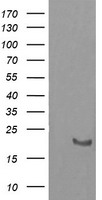p21 Ras (HRAS) Mouse Monoclonal Antibody [Clone ID: OTI1C8]
CAT#: CF505666
Carrier-free (BSA/glycerol-free) HRAS mouse monoclonal antibody,clone OTI1C8
Formulation: Standard
Specifications
| Product Data | |
| Clone Name | OTI1C8 |
| Applications | IF, IHC, WB |
| Recommended Dilution | WB 1:2000, IHC 1:150, IF 1:100 |
| Reactivities | Human, Mouse, Rat |
| Host | Mouse |
| Isotype | IgG1 |
| Clonality | Monoclonal |
| Immunogen | Full length human recombinant protein of human HRAS(NP_005334) produced in HEK293T cell. |
| Formulation | Lyophilized powder (original buffer 1X PBS, pH 7.3, 8% trehalose) |
| Reconstitution Method | For reconstitution, we recommend adding 100uL distilled water to a final antibody concentration of about 1 mg/mL. To use this carrier-free antibody for conjugation experiment, we strongly recommend performing another round of desalting process. (OriGene recommends Zeba Spin Desalting Columns, 7KMWCO from Thermo Scientific) |
| Purification | Purified from mouse ascites fluids or tissue culture supernatant by affinity chromatography (protein A/G) |
| Conjugation | Unconjugated |
| Storage | Store at -20°C as received. |
| Stability | Stable for 12 months from date of receipt. |
| Predicted Protein Size | 21.1 kDa |
| Gene Name | Homo sapiens HRas proto-oncogene, GTPase (HRAS), transcript variant 1, mRNA. |
| Database Link | |
| Background | This gene belongs to the Ras oncogene family, whose members are related to the transforming genes of mammalian sarcoma retroviruses. The products encoded by these genes function in signal transduction pathways. These proteins can bind GTP and GDP, and they have intrinsic GTPase activity. This protein undergoes a continuous cycle of de- and re-palmitoylation, which regulates its rapid exchange between the plasma membrane and the Golgi apparatus. Mutations in this gene cause Costello syndrome, a disease characterized by increased growth at the prenatal stage, growth deficiency at the postnatal stage, predisposition to tumor formation, mental retardation, skin and musculoskeletal abnormalities, distinctive facial appearance and cardiovascular abnormalities. Defects in this gene are implicated in a variety of cancers, including bladder cancer, follicular thyroid cancer, and oral squamous cell carcinoma. Multiple transcript variants, which encode different isoforms, have been identified for this gene. [provided by RefSeq, Jul 2008] |
| Synonyms | C-BAS/HAS; C-H-RAS; C-HA-RAS1; CTLO; H-RASIDX; HAMSV; HRAS1; p21ras; RASH1 |
| Reference Data | |
| Protein Families | Druggable Genome |
| Protein Pathways | Acute myeloid leukemia, Axon guidance, B cell receptor signaling pathway, Bladder cancer, Chemokine signaling pathway, Chronic myeloid leukemia, Endocytosis, Endometrial cancer, ErbB signaling pathway, Fc epsilon RI signaling pathway, Focal adhesion, Gap junction, Glioma, GnRH signaling pathway, Insulin signaling pathway, Long-term depression, Long-term potentiation, MAPK signaling pathway, Melanogenesis, Melanoma, Natural killer cell mediated cytotoxicity, Neurotrophin signaling pathway, Non-small cell lung cancer, Pathways in cancer, Prostate cancer, Regulation of actin cytoskeleton, Renal cell carcinoma, T cell receptor signaling pathway, Thyroid cancer, Tight junction, VEGF signaling pathway |
Documents
| Product Manuals |
| FAQs |
| SDS |
Resources
| Antibody Resources |
Other Versions
| SKU | Description | Size | Price |
|---|---|---|---|
| TA505666 | HRAS mouse monoclonal antibody,clone OTI1C8 |
USD 447.00 |
|
| TA505666AM | HRAS mouse monoclonal antibody,clone 1C8, Biotinylated |
USD 509.00 |
|
| TA505666BM | HRAS mouse monoclonal antibody,clone 1C8, HRP conjugated |
USD 509.00 |
|
| TA505666S | HRAS mouse monoclonal antibody,clone OTI1C8 |
USD 200.00 |
{0} Product Review(s)
Be the first one to submit a review






























































































































































































































































 Germany
Germany
 Japan
Japan
 United Kingdom
United Kingdom
 China
China








